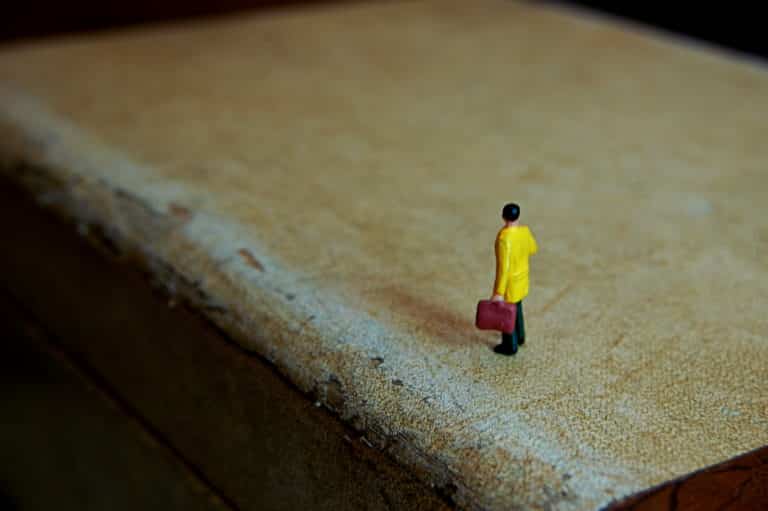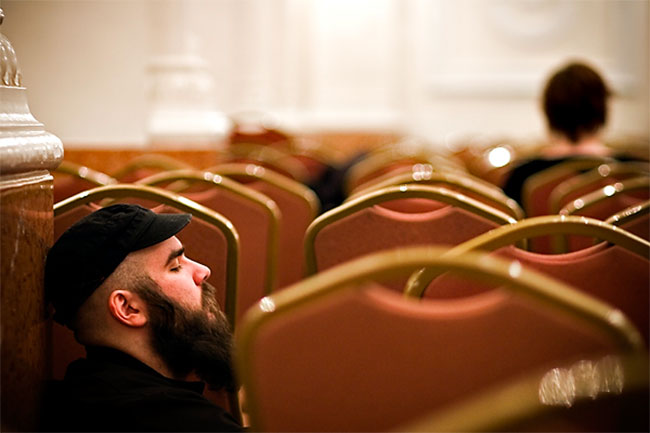
Image by JD Hancock/Flickr, Attribution.
Is There a Bomb in Your Suitcase?
How do you respond to prejudice when it is blatant, direct, and in your face?
A few weeks ago, I traveled to Europe to take part in conference of European and North American Muslim leaders. It was a distinguished lineup of community leaders, spiritual figures, artists, activists, and scholars. So much talent, so much creativity.
I was traveling with a small pack of brothers. A dear friend, Wajahat Ali, is a TV host on Al Jazeera America, a brilliant public intellectual, playwright, and more. He has been invited to the White House, the State Department, and talked in more countries than I can count. Another dear friend, Abdullah Antepli, is a nationally respected interfaith leader who has opened the U.S. Congress in prayer.
Poor Wajahat had an overnight flight from the U.S., and Abdullah and I took an early morning flight. We met up in Amsterdam and had the day to spend looking around before heading to the conference. We had made a hotel reservation near the train station, and headed there to see if we could check in to our room early, or leave our luggage.
Amsterdam is a fascinating city. It’s a beautiful, cosmopolitan place with gorgeous canals and bridges. Yes, there is the smell of pot in the air, and cafés where they are happy to educate you in pot-ology. (We did not partake, in case anyone asks.) And there is the Red Light District (aka De Wallen), which is oddly woven into the tourist industry. You hear lots of languages spoken: English, Dutch, Turkish, a Moroccan dialect of Arabic, French, German, Russian. Joints line the streets offering falafel, Indian food, Dutch cheese, and Turkish kabobs.
We found our hotel, and walked through the narrow entrance to find the front desk. Seated behind the desk was an attractive Dutch woman in her 30s. She was tall and lean, multi-lingual, friendly but professional. We presented ourselves and asked about our room. She looked into her computer, and eventually found our reservation. But alas, our room wouldn’t be available till the afternoon time. We said, OK, no problem, we would be happy to leave our luggage with her and come back after lunch and check in to our room.
And then came the statement that cut through the early morning Amsterdam air. She turned to me and asked in the most matter of fact way, “Is there a bomb in your suitcase?”
I had to pause to make sure my ears were not playing tricks on me. “Is there a bomb in your suitcase?”
I looked over at Abdullah and Wajahat. An uncomfortable silence sat among us, with no one knowing quite what to say. Mind you, none of us ever seem to be at a loss for words. This was not the type of Muslim humor when we make jokes about getting the brown person treatment at airport, getting a free “massage” [i.e., pat down] at the check in line, or saying hello to the NSA agent when we pick up our phone. Those jokes were our jokes, an attempt to exercise some ownership over a situation, and acknowledge solidarity.
This was cold, factual, and direct. “Is there a bomb in your suitcase?” It was not said with a smirk, or a smile, or sarcasm. It was one Dutch woman’s genuine fear of three brown men who had wandered into her hotel with a reservation. We were being collectively held responsible for the action of some Muslim zealots somewhere.
I somehow fumbled and stumbled out a few pathetic words, “No, ma’am. We are not that kind of Muslims.” Abdullah, a bit more clever, said, “The only dangerous things in our luggage are some dirty underwear.” She did not laugh. There was fear in her eyes. Wajahat said later, “You should have seen Omid, the teddy bear of love and justice, turning red.” She did not laugh.
Eventually we had to put down a deposit on our luggage to have it be kept until the afternoon. We wandered out, and that’s when the uncomfortableness of the whole exchange washed over us.
“Could you believe what she said?” “Oh my God she wasn’t kidding.”
We thought of the clever comebacks we wish we had had at the moment. We wondered if our luggage would be still there when we would make it back to the hotel.
Which makes me wonder: What do you do in face of direct, unveiled prejudice? How do you counter it?
My son, who is 21 years old, is a Muslim. He is tall and blonde, blue eyed and freckled face. Not exactly your stereotype of a Muslim. So many people say things about Muslims around him that they wouldn’t dare say around me. What’s he to say? Is he to respond? How is he to respond?
Here’s one thing I have learned over 20 years of interfaith activity, community talks, and scholarly presentations. Yes, facts and data are necessary. We need to be able to talk in calm, measured ways and put things in a context, and qualify them. It is important to talk about ISIS and Al-Qaeda, give a sense of their numbers, their reach, and how they have been condemned again and again by the overwhelming majority of Muslims.
But what do you do when public figures (“New Atheists” like Sam Harris) describe the faith that gives meaning and beauty to your life as “But Islam is the mother lode of bad ideas at the moment” and other public figures (alleged liberals like Bill Maher) affirm those blatantly xenophobic statements by adding, “That’s just a fact.”
How do you counter people’s nonsensical “facts” with better facts? Can you reason with bigots? I am not sure.
We live in a world in which there is often much heat, and all too little light, in our public discourse. How do we bring a sense of sanity and humanity to these conversations about difficult issues?
But here is the one thing I do know works: face-to-face, human-to-human interactions — getting to know people on a personal level, getting to know each others’ families and breaking bread together. There is a beautiful transformation that happens when we sit down across a table from one other and share a meal. Lo and behold, we find that we all love our children, that we all want the best for them, that we all share many of the same fears about our kids.
I think about that woman in the Amsterdam hotel and wonder what would happen to her if she had some Muslim friends, and how she might have treated the next set of Muslim hotel guests.
I think it would make a difference. There is a grace, a magic, that happens in that face-to-face encounter.

